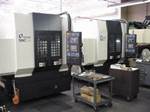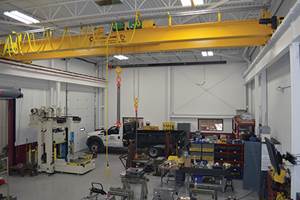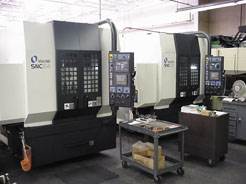Leadtime Leader Q&A: Offshore Competition
MoldMaking Technology's 2003 Leadtime Leaders relate how foreign competition motivates them.
Each month, the winners of MoldMaking Technology magazine's First Annual Leadtime Leader Award Competition assemble in this regular column to reveal their thoughts about a number of topical matters in the industry. The award-designed to recognize outstanding U.S. moldmaking shops and their ability to succeed in today's global mold market-highlighted six shops that showed outstanding performance in the following areas: leadtime, current and projected sales growth, innovation in the moldmaking process as well as innovation in the business side of moldmaking, technology, industry involvement and customer service.
The topic up for debate this time around is probably the industry's biggest challenge-offshore competition and how the Leadtime Leaders deal with it in their shops through leadtime reduction, innovation and excellent customer service.
Steve Johanns, managing director, business development, Advance Tool, Inc. (Blaine, MN)
ATI is motivated by competition in any form-whether it is coming from the U.S., China, Mexico, Canada or any other place on the globe. Our focus has been to develop our business to be flexible and innovative enough to adapt to the changes and challenges of the industry. We are very familiar with the challenges and issues of building tooling offshore. We have been building tooling in Asia for more than twelve years. We opened our first office in Taiwan in 1994 and in 2001 we opened ATI Precision Tool in Penang, Malaysia. We've been through the good, the bad and the ugly associated with offshore tooling. One thing is for sure...it is not going away.
As we look ahead, we see the opportunity to be a global tooling solution provider as more of an opportunity than a threat. Our U.S. operation is focused on aligning with the right customers that can leverage our technical capabilities and capacity on larger programs with more complicated high production tooling requirements, while our offshore operations today and into the future will be focused on supporting the market locations they serve.
Offshore competition also creates the motivation to become better, smarter and faster with our U.S. manufacturing capabilities. Technology, communication and accountability are the three areas we are beginning to see have a real impact. It is not easy, but it can be done. Last year we built more than thirty tools in the U.S. for a long-time customer that we actually exported into China. We competed with other shops in places like Singapore and China. Obviously we weren't the lowest priced supplier, but because of our relationship with the customer and our suppliers we were able to take risk and cost out of a highly visible program and make our case that led to us being awarded the business.
Every customer (whether they realize it or not) does a cost/risk analysis. The successful moldmakers understand how to make their case. Serving global customers requires that you have the additional puzzle pieces to make your case work. That's where understanding offshore business and having the right resources can benefit the successful growth of well-managed U.S. moldmakers.
Rich Burman, president, Graphic Tool Corp. (Itasca, IL)
Offshore competition is what keeps us from becoming complacent. I'm not saying that I like the fact that Asia has workers that get paid a fraction of what we pay our employees, but this fact is what keeps us thinking. We must be on the cutting edge of technology with our equipment and our process. We also must give our customers a reason to pay a little more due to the service they receive from us versus Asia. Many times, the final cost savings is not enough to offset the loss of the help we provide with product design and tooling expertise. It is also much easier to communicate with us, than with people halfway around the world.
Wayne Shakal, business development manager, Ultra Tool Group (Grantsburg, WI)
The moldmaking climate in the U.S. over the last couple of years has made this question very easy for us to answer. Simply stated, offshore competition has motivated us to constantly think of new ways to improve our mold manufacturing process-from markets that are different from where we were two to three years ago to new services and technologies that will help our customers be more competitive than they are today.
We've noticed that as our industry continues to mature and increasingly become a global commodity, it is virtually impossible to continue to grow by doing things that can also be done by many of our competitors. Fortunately, we can still capitalize on offering our clients solutions that will get them to market on time. Leadtimes on tooling have decreased dramatically all over the world, but in many cases we've seen substantial delays on the back-end. This is never expected but happens time and time again. We've proven that we're very good at it and we're motivated to get even better at it. This is an area for any moldmaker to strive to excel at in order to maintain existing customers and add new ones.
Secondly, we are motivated to innovate. It is critical that we continue to develop technology that continuously takes tooling to the next level. Specifically, we put a lot of emphasis on finding better ways of molding extremely high volume applications for both single and multishot applications. This allows us to reduce the need to always compete on price with offshore competition. When a customer has volumes of 500,000,000 pieces annually, they will invest in top-tier tooling. It's even easier to justify when this tooling saves them 30 percent on their cycle time.
Related Content
Tackling a Mold Designer Shortage
Survey findings reveal a shortage of skilled mold designers and engineers in the moldmaking community, calling for intervention through educational programs and exploration of training alternatives while seeking input from those who have addressed the issue successfully.
Read MoreHow to Improve Your Current Efficiency Rate
An alternative approach to taking on more EDM-intensive work when technology and personnel investment is not an option.
Read MoreThe Trifecta of Competitive Toolmaking
Process, technology and people form the foundations of the business philosophy in place at Eifel Mold & Engineering.
Read MoreDynamic Tool Corporation – Creating the Team to Move Moldmaking Into the Future
For 40+ years, Dynamic Tool Corp. has offered precision tooling, emphasizing education, mentoring and innovation. The company is committed to excellence, integrity, safety and customer service, as well as inspiring growth and quality in manufacturing.
Read MoreRead Next
Graphic Tool: Concurrent Engineering Generates Quick Mold Builds
Using the latest in technology and equipment concurrently adds up to sales aplenty - and an Honorable Mention in MoldMaking Technology magazine's Leadtime Leader competition.
Read MoreReasons to Use Fiber Lasers for Mold Cleaning
Fiber lasers offer a simplicity, speed, control and portability, minimizing mold cleaning risks.
Read MoreHow to Use Strategic Planning Tools, Data to Manage the Human Side of Business
Q&A with Marion Wells, MMT EAB member and founder of Human Asset Management.
Read More













.jpg;maxWidth=300;quality=90)







.jpg;maxWidth=970;quality=90)